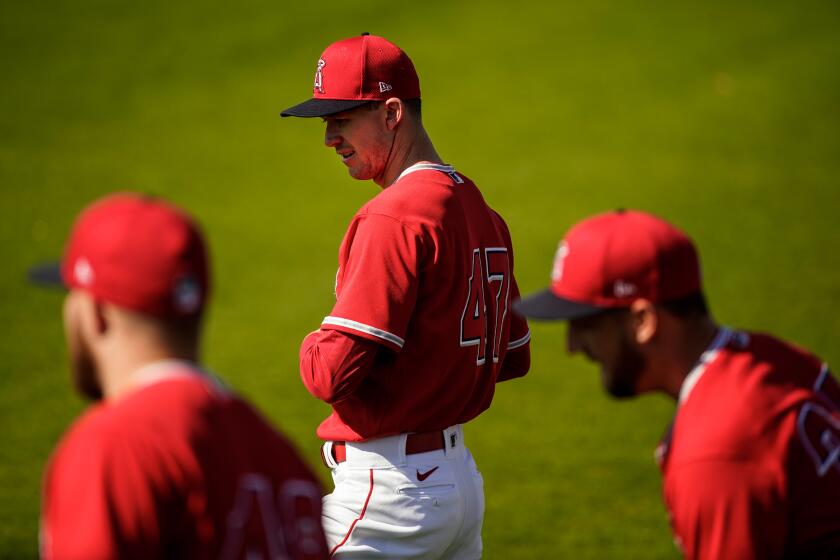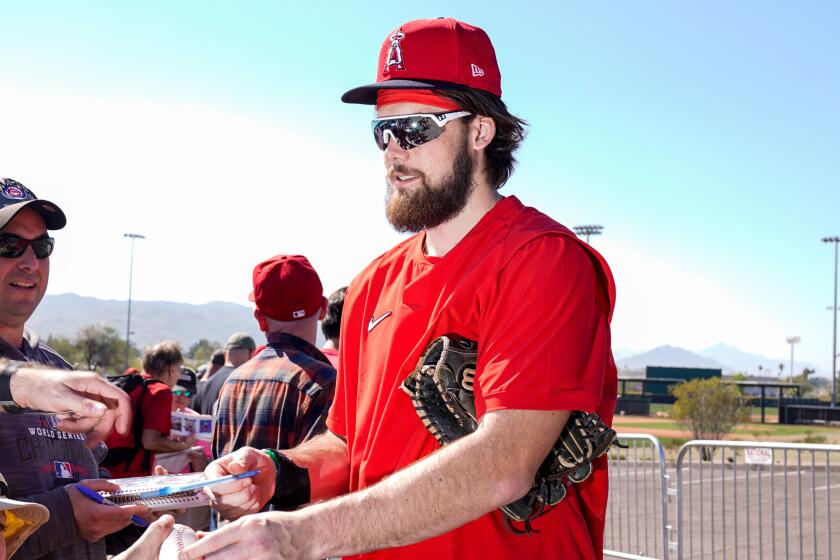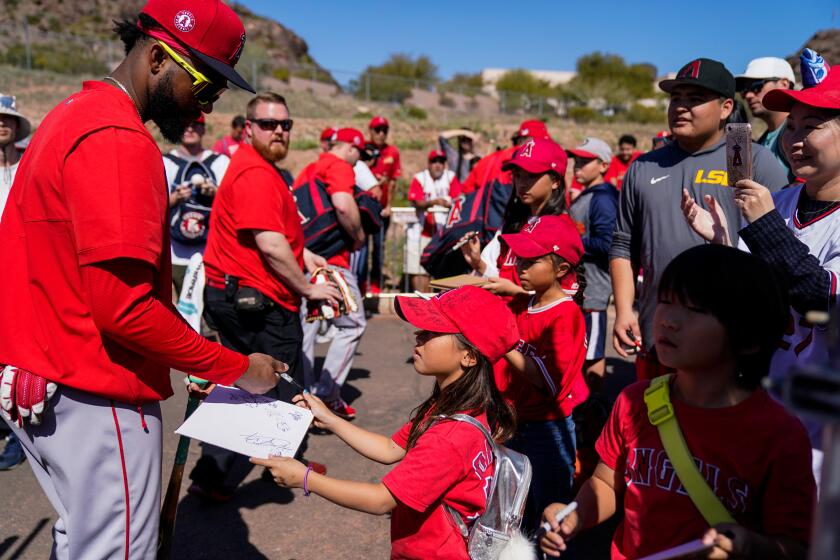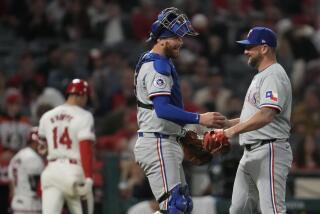Angels pitcher Andrew Heaney opens up about friend Tyler Skaggs
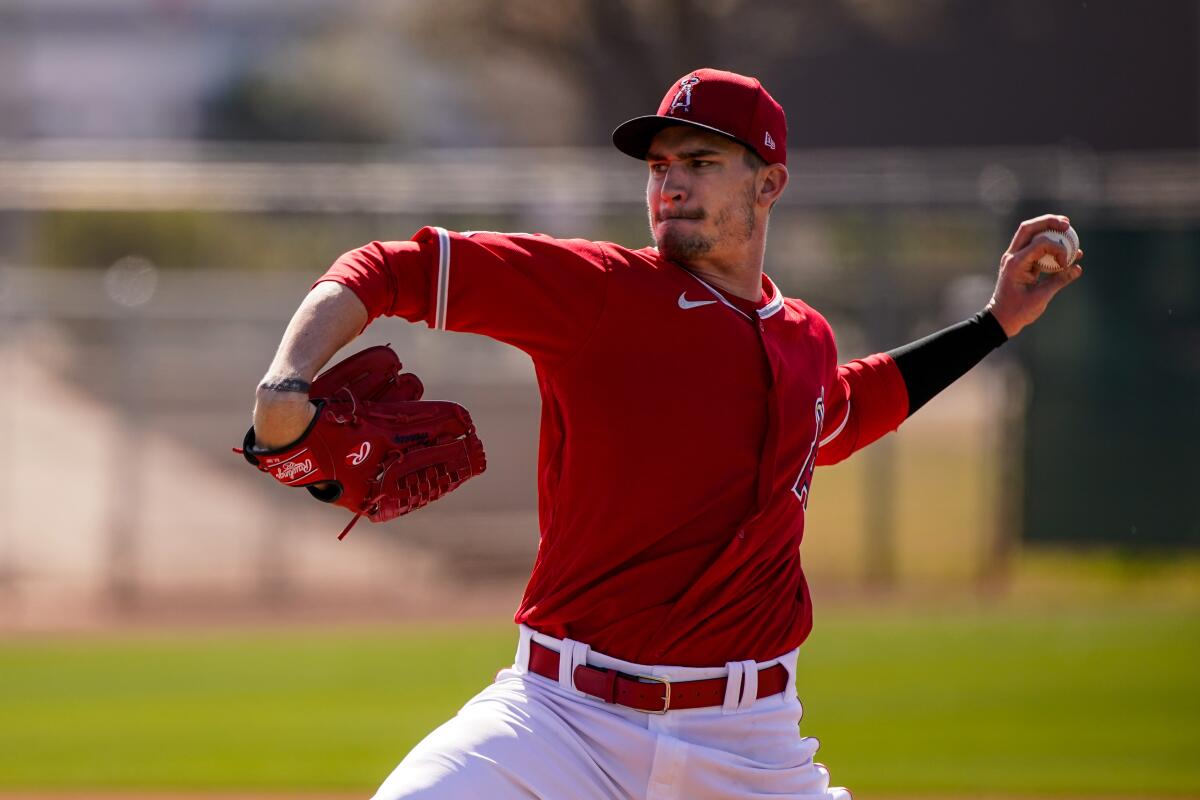
TEMPE, Ariz. — They were the best of friends, born 38 days apart, working the same job, traveling the country together. Then Tyler Skaggs died, and Andrew Heaney had to find the words to say farewell at his memorial service.
Traditional words of comfort would be of little use. Skaggs, like Heaney a member of the Angels’ starting rotation, had not lived a full life, had not been blessed with children or grandchildren. Amid the grief, however, smiles were shared and stories told.
So Heaney put on his headphones, pulled out his phone, and started writing. The Angels were flying somewhere. He doesn’t remember where. He had so much to say, or at least to think about saying.
“I’d just kind of sit there typing on my phone,” Heaney said, “figuring out what captured how I felt about him. That’s hard to do, especially when you’re trying not to stand up there for 30 minutes.”
Heaney is 28. He never had spoken at a memorial service, let alone a televised one. He asked his wife to look over his words. He showed them to Andrew Bailey, then the Angels’ bullpen coach.
Since being drafted by the Angels in the second round out of UCLA in 2017, Griffin Canning has been viewed as a potential front-line starter for his hometown team.
Above all, Heaney asked his father for advice. His father is a pastor, and a counselor.
“He understands words,” Heaney said, “and how to best put them together.”
The 900 seats at St. Monica’s Catholic Church in Santa Monica were full that July day. The Angels arrived as a team, on three buses. Heaney was one of 14 speakers.
The last speaker was Skaggs’ wife, Carli, who talked of the couple’s plan to start a family, and of “late-night runs to In-N-Out.” After the service, mourners walked out of the church, and to a reception that featured an In-N-Out burger truck.
The Angels went back to work, uneasily. Their muddle to the finish line of a miserable season was interrupted by a jolt Aug. 30, when autopsy results revealed that Skaggs had choked on his own vomit, under the influence of fentanyl, oxycodone and alcohol.
Heaney is frustrated by pronouncements that Skaggs must have been a drug addict, and that the team must have known about it. A federal investigation is ongoing.

“I don’t think it’s fair for people to say he was an addict,” Heaney said. “I don’t think anybody understands the depth and level of what he was going through, whether it was an addiction or an abuse or a misuse.”
Skaggs died in a hotel room in Texas on July 1, hours after the Angels had flown there from Anaheim.
“We’ve talked about it a million times,” Heaney said. “We were all on the flight. It’s not like we carried him off the plane. That [stuff] could happen in an instant.
“If anybody felt like he had a problem, and it was obvious, we would have said something.
“I don’t think he did [have a drug problem]. I still believe that, to this day. Trust me, I’ve thought about it a million times. That [crap] had to play out exactly how it played out to have the effect that it did.”
The lasting effect of Skaggs’ death on the rest of the major leagues is substantial: opioid testing, jointly adopted by the commissioner’s office and the players’ union. If such testing can identify even one player that needs help, the union agreed, let us test all our players. And if any player should test positive, the league agreed, let us provide that player with counseling and treatment, not a suspension.
Outfielder Brandon Marsh, the Angels’ No. 2 prospect, will be out several weeks with a strained left elbow. He hurt it while attempting a diving catch.
“I would say that, with a collective group of 20- to 35-year old guys, statistically, just like in society, you probably have the same substance abuse issues,” Heaney said. “But you’re also in a situation where you’re in a stressful job, where most guys are playing through chronic pain and discomfort. There’s all kinds of issues.
“It’s the same in society, right? I wouldn’t say it’s a problem in baseball. I don’t think it’s exclusively a baseball issue, or a sports issue. It’s a societal one. I don’t want to call it an epidemic. I don’t know what you call it.”
Maybe you do call it an epidemic. In 2018, more than 31,000 Americans died after taking fentanyl or a similar substance, more than any other drug had killed in any one year.
“The education is important,” Heaney said. “As players, we felt like we wanted to be able to protect guys in the future, and get them help.”
For Heaney and the Angels, the future is here, in the form of a new season. Heaney wears a memorial tattoo on his wrist.
The memorial patches on the Angels’ uniforms are gone now, but the memories remain, and the human connections that endure when the ceremonial gestures are exhausted. Heaney and his wife stay in touch with Skaggs’ wife. Heaney texts with Skaggs’ mother.
New Angels manager Joe Maddon rewards players with ‘I GOT LOUD’ T-shirts when they make impressive contact. He expects prospect Jo Adell to get loud in the future.
“Probably not as much as I should,” Heaney said.
It is time, once again, to play ball.
“For me, I’m in a good place,” Heaney said. “I feel like I’m at peace with what happened and how I have processed it.
“I wish he were here. It’s hard to move on. But it’s just part of life, I guess.”
Hardly a day goes by when Heaney does not think of Skaggs. It could have been turning to him in the dugout, to talk about how to pitch to a certain batter. It could have been something wacky that Heaney would have texted him, or yelled to him.
Or it could have been one of the stories Heaney told at the memorial service, about jumping into Skaggs’ monster truck here last spring, and hearing the guy who loved to play the latest and loudest music crank up the volume for the soft piano intro to Elton John’s “Tiny Dancer.”
Skaggs wore a goofy grin that day. That is the persona that Heaney chooses to remember, as he so eloquently told the audience at the memorial service.
These were Heaney’s closing words that day: “Take a moment and think of a story or an image that reminds you of all the good times you had with Ty. Take that memory and hold it in your hearts and in your minds. That is his lasting gift to everyone here.”
More to Read
Go beyond the scoreboard
Get the latest on L.A.'s teams in the daily Sports Report newsletter.
You may occasionally receive promotional content from the Los Angeles Times.

